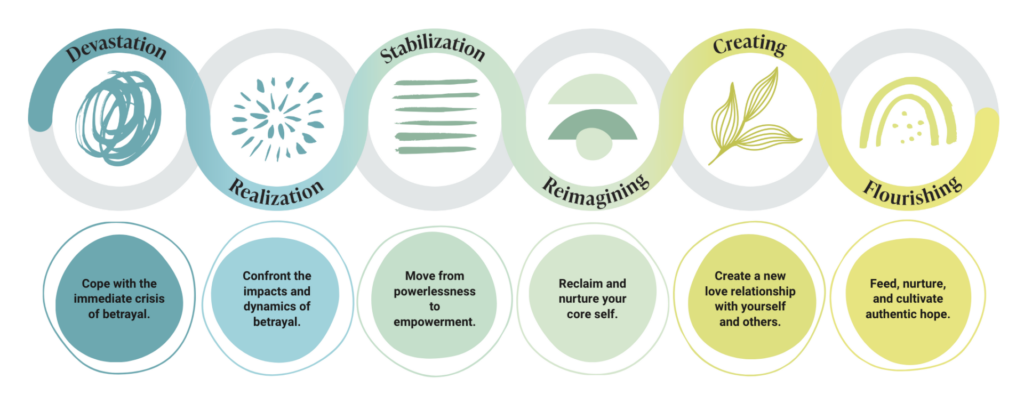
The creating phase is where all that you dreamed of and thought about in the re-imagining phase begins to take shape. In this phase, the changes that you have been making, the new skills that you have been learning, and the self-knowledge that you have gained start to add up to a new way of life and a new way of being in relationship with both yourself and others.
This is also the phase where some of the deepest healing happens. In this phase, your sexual and relational wounds are emotionally engaged in a way that allows transformation of not just the mind but the heart.
If you are a betrayed partner, you know that the efforts your significant has made to repair things have fallen short. And this assessment does not discount the tremendous effort that your partner has likely made. He may have started to attend weekly therapy, group therapy, a 12-Step program, done homework, made phone calls, attended classes, and put all that he is learning into practice. All of this is vital to the healing process, and betrayed partners whose significant others do these things experience much greater hope and earlier stability in their relationships. But in some ways these efforts are just not enough.
If you’re like most betrayed partners, you have watched and participated in this journey and wondered why, when your spouse is obviously trying so hard, his efforts aren’t resolving the core pain that you still feel. Well, here is the reason: To truly heal betrayal at the heart level, emotional connection, empathy, compassion, regret, remorse, and guilt must be felt and experienced together, simultaneously by you and your partner, in a meaningful and intentional way. Your partner must be willing to hold your pain while feeling his own pain over causing your pain. Your partner must be willing to feel his guilt and remorse and share it with you with vulnerability. At the same time, you must be willing to let down your guard and talk about the rawest places in your heart, taking the risk of opening yourself and being vulnerable with the one who hurt you.
You may be saying to yourself, “But I have done that. I’ve talked about how much he hurt me until I have had no words left, and it didn’t help.” If so, you’re not alone. Most partners have talked about their pain at length with their cheating partner (and others). However, this typically happens early in the healing process, shortly after discovery when emotions are running high and the cheating partner is defensive.
What I am talking about here is a different and deeper level of communication about these issues. And that typically cannot happen until this later stage of the recovery process, when both of you have done some individual healing, learned to connect to your emotional selves, worked through defenses that come up, and can stay present with one another in the face of conflict. These are the tasks that pave the way for the possibility of true repair, restoration, forgiveness, and reconciliation.
Perhaps you have arrived at the creating phase as a newly single person who has had to make the hard choice to leave your relationship. If so, you are probably wondering what this phase holds for you. It holds the same gifts, just experienced in different ways. If you have divorced or are in the process of divorcing, you still must do the deep heart work of forgiving your cheating partner and letting go so you can move on to a better life. Forgiveness sets you free and releases you from lingering emotional ties to your partner that might rob you of your power and serenity. You also receive the gifts of vulnerability as you learn to open your heart and take risks in relationships again.












